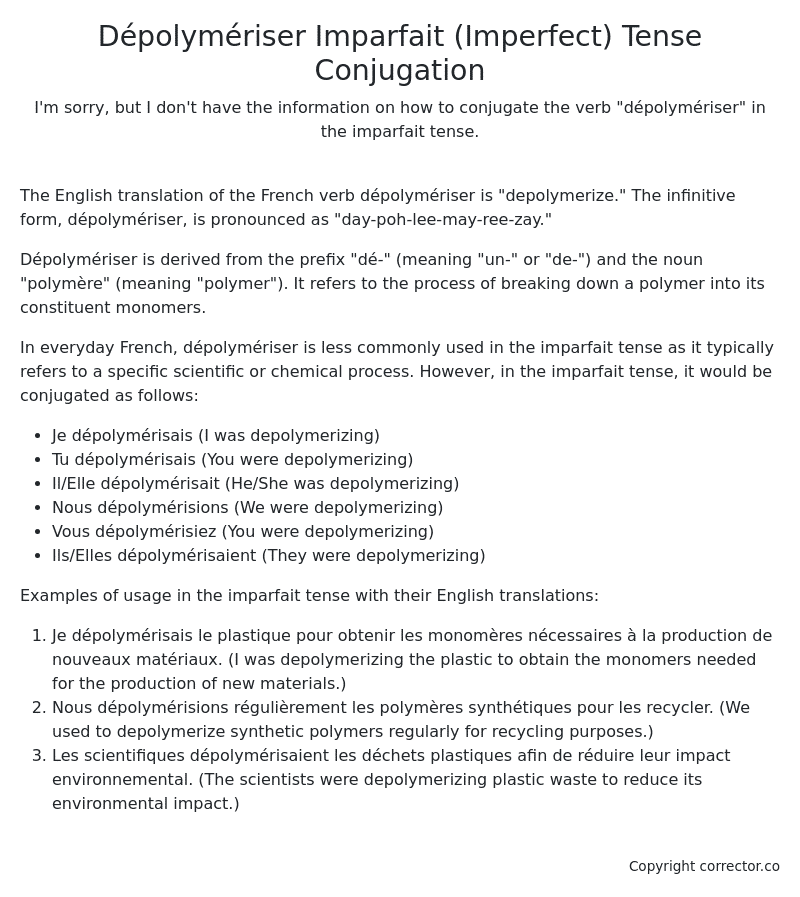Imparfait (Imperfect) Tense Conjugation of the French Verb dépolymériser
Introduction to the verb dépolymériser
The English translation of the French verb dépolymériser is “depolymerize.” The infinitive form, dépolymériser, is pronounced as “day-poh-lee-may-ree-zay.”
Dépolymériser is derived from the prefix “dé-” (meaning “un-” or “de-“) and the noun “polymère” (meaning “polymer”). It refers to the process of breaking down a polymer into its constituent monomers.
In everyday French, dépolymériser is less commonly used in the imparfait tense as it typically refers to a specific scientific or chemical process. However, in the imparfait tense, it would be conjugated as follows:
- Je dépolymérisais (I was depolymerizing)
- Tu dépolymérisais (You were depolymerizing)
- Il/Elle dépolymérisait (He/She was depolymerizing)
- Nous dépolymérisions (We were depolymerizing)
- Vous dépolymérisiez (You were depolymerizing)
- Ils/Elles dépolymérisaient (They were depolymerizing)
Examples of usage in the imparfait tense with their English translations:
- Je dépolymérisais le plastique pour obtenir les monomères nécessaires à la production de nouveaux matériaux. (I was depolymerizing the plastic to obtain the monomers needed for the production of new materials.)
- Nous dépolymérisions régulièrement les polymères synthétiques pour les recycler. (We used to depolymerize synthetic polymers regularly for recycling purposes.)
- Les scientifiques dépolymérisaient les déchets plastiques afin de réduire leur impact environnemental. (The scientists were depolymerizing plastic waste to reduce its environmental impact.)
Table of the Imparfait (Imperfect) Tense Conjugation of dépolymériser
I’m sorry, but I don’t have the information on how to conjugate the verb “dépolymériser” in the imparfait tense.
Other Conjugations for Dépolymériser.
Le Present (Present Tense) Conjugation of the French Verb dépolymériser
Imparfait (Imperfect) Tense Conjugation of the French Verb dépolymériser (You’re reading it right now!)
Passé Simple (Simple Past) Tense Conjugation of the French Verb dépolymériser
Passé Composé (Present Perfect) Tense Conjugation of the French Verb dépolymériser
Futur Simple (Simple Future) Tense Conjugation of the French Verb dépolymériser
Futur Proche (Near Future) Tense Conjugation of the French Verb dépolymériser
Plus-que-parfait (Pluperfect) Tense Conjugation of the French Verb dépolymériser
Passé Antérieur (Past Anterior) Tense Conjugation of the French Verb dépolymériser
Futur Antérieur (Future Anterior) Tense Conjugation of the French Verb dépolymériser
Subjonctif Présent (Subjunctive Present) Tense Conjugation of the French Verb dépolymériser
Subjonctif Passé (Subjunctive Past) Tense Conjugation of the French Verb dépolymériser
Subjonctif Imparfait (Subjunctive Imperfect) Tense Conjugation of the French Verb dépolymériser
Conditionnel Présent (Conditional Present) Tense Conjugation of the French Verb dépolymériser
Conditionnel Passé (Conditional Past) Tense Conjugation of the French Verb dépolymériser
Conditionnel Passé II (Conditional Past II) Tense Conjugation of the French Verb dépolymériser
L’impératif Présent (Imperative Present) Tense Conjugation of the French Verb dépolymériser
L’impératif Passé (Imperative Past) Tense Conjugation of the French Verb dépolymériser
L’infinitif Présent (Infinitive Present) Tense Conjugation of the French Verb dépolymériser
L’infinitif Passé (Infinitive Past) Tense Conjugation of the French Verb dépolymériser
Le Participe Présent (Present Participle) Tense Conjugation of the French Verb dépolymériser
Le Participe Passé (Past Participle) Tense Conjugation of the French Verb dépolymériser
Struggling with French verbs or the language in general? Why not use our free French Grammar Checker – no registration required!
Get a FREE Download Study Sheet of this Conjugation 🔥
Simply right click the image below, click “save image” and get your free reference for the dépolymériser imparfait tense conjugation!

Dépolymériser – About the French Imparfait Tense
NOTE: To take a deep dive into all the French tenses then see our article on Mastering French Tense Conjugation.
Formation of the Imparfait Tense
For regular -er verbs:
For regular -ir verbs
For regular -re verbs
Common Everyday Usage Patterns
Description of Past Habits
Background Information
Mental and Emotional States
It’s employed to express emotions, thoughts, or physical sensations in the past. For example: “J’étais content quand il est arrivé.” (I was happy when he arrived.)
Ongoing Actions
Points to Note About the Imparfait Tense
Passé Composé vs. Imparfait
Conditional
Si Clauses
Narration
I hope you enjoyed this article on the verb dépolymériser. Still in a learning mood? Check out another TOTALLY random French verb imparfait conjugation!


